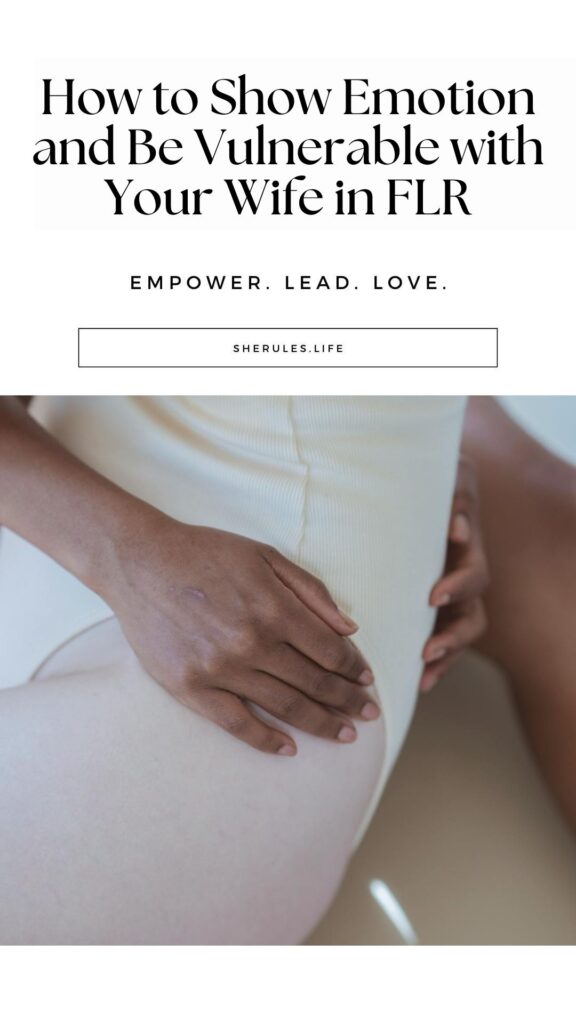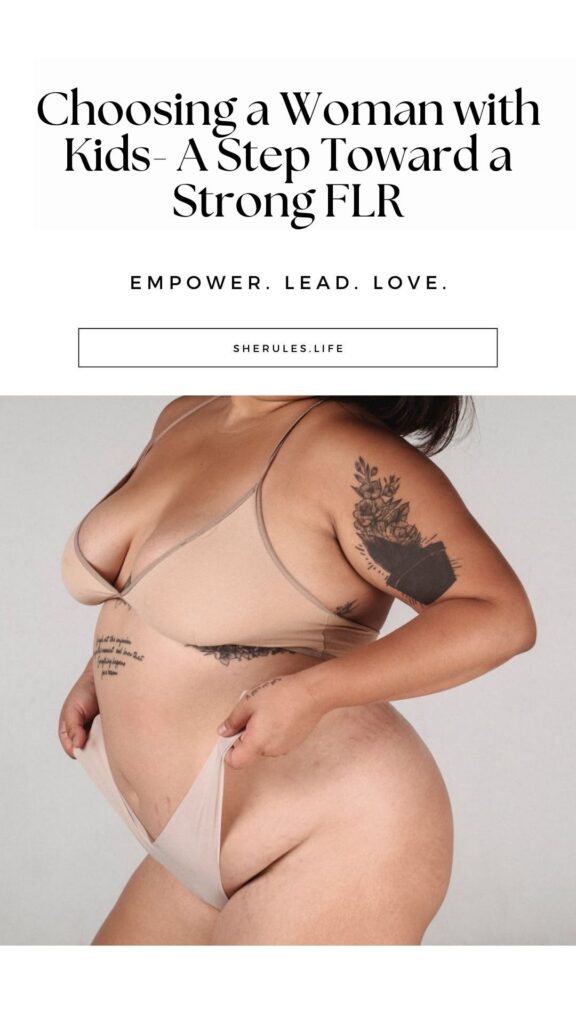
Today, we’ll dive into a topic that can be both sensitive and transformative: how to show emotion and be vulnerable with your wife in an FLR.
In any relationship, vulnerability is a crucial component that fosters deeper connection and understanding. In the context of a Female Led Relationship, where the dynamic might be different from traditional roles, showing emotion and being vulnerable can take on unique dimensions.
Let’s explore how you can embrace these aspects to strengthen your relationship and create a more fulfilling partnership.
Understanding Vulnerability in FLR
Vulnerability is often seen as a weakness, but in reality, it’s a strength that builds trust and intimacy. In an FLR, vulnerability can be particularly significant. It’s not just about sharing your feelings; it’s about opening up in a way that aligns with the dynamics of your relationship.
Why Being Emotionally Open is Important
In any relationship, emotional openness helps in:
- Building Trust: When you show your true self, including your fears and insecurities, you build trust. This is vital in any relationship but especially in FLR, where the dynamics might challenge traditional norms.
- Deepening Connection: Sharing your emotions allows for a deeper connection with your partner. It helps both partners understand each other’s perspectives and fosters a stronger bond.
- Enhancing Communication: Being open about your feelings improves communication. It helps in addressing issues more effectively and prevents misunderstandings.
- Supporting Each Other: When you’re vulnerable, it creates a space for your partner to be vulnerable too, which can lead to mutual support and understanding.
Steps to Show Emotion and Be Vulnerable
- Acknowledge Your Feelings
Before you can share your emotions, you need to recognize them yourself. Take some time to reflect on what you’re feeling and why. Are you anxious, sad, or overwhelmed? Understanding your emotions is the first step toward expressing them.
- Communicate Openly
Once you’ve acknowledged your feelings, communicate them to your wife. Be honest and direct about what you’re experiencing. Use “I” statements to express how you feel and avoid placing blame. For example, say “I feel stressed about work” rather than “You don’t understand how stressed I am.”
- Practice Active Listening
When your wife responds, listen actively. This means giving her your full attention and acknowledging her feelings. Active listening involves nodding, maintaining eye contact, and responding thoughtfully. It shows that you value her perspective and are engaged in the conversation.
- Be Open to Feedback
Being vulnerable means being open to feedback, whether it’s positive or constructive. Your wife might offer insights or advice, and being receptive to this feedback can help you grow and strengthen your relationship.
- Share Your Hopes and Fears
Let your wife in on your dreams and worries. Sharing your aspirations can bring you closer, and expressing your fears can help you work through them together. This not only fosters intimacy but also allows your wife to support you in meaningful ways.
- Show Appreciation
Express gratitude for your wife’s support and understanding. Acknowledging her efforts reinforces your bond and shows that you value her role in your life.
Integrating Vulnerability into Your FLR
In an FLR, the dynamics might involve traditional roles being flipped or redefined. Showing vulnerability can sometimes feel challenging within these dynamics, but it’s essential to:
- Respect the Dynamics: Understand and respect the FLR dynamic you have agreed upon. Being vulnerable doesn’t mean undermining the roles or boundaries you’ve established. It means being honest within those frameworks.
- Balance Power Dynamics: Ensure that your vulnerability doesn’t disrupt the balance of power in the relationship. It should complement and enhance your dynamic rather than create tension.
- Seek Support When Needed: If you find it challenging to be vulnerable, consider seeking support from a therapist or counselor who can help navigate these emotions within the FLR framework.
Examples of Vulnerability in FLR
Here are a few practical examples of how vulnerability might look in your FLR:
- Sharing Your Day: Take time to share the highlights and challenges of your day with your wife. This simple act of sharing can open doors to deeper conversations.
- Expressing Doubts: If you’re unsure about something, whether it’s a decision or a feeling, express this to your wife. It shows that you value her input and trust her judgment.
- Discussing Relationship Goals: Talk about your hopes and concerns for your relationship. This includes discussing how you can both contribute to making the relationship more fulfilling.
- Acknowledging Mistakes: If you’ve made a mistake or feel you’ve fallen short in some way, acknowledge it openly. Apologizing and discussing how to improve demonstrates humility and a willingness to grow.
The Role of Emotional Support in FLR
Providing emotional support in an FLR can look different depending on your roles, but it’s crucial for maintaining a healthy and fulfilling relationship. Support might include:
- Listening Actively: Be there to listen and provide comfort when your wife needs it.
- Offering Encouragement: Support her ambitions and validate her feelings, whether she’s facing challenges or celebrating successes.
- Being Present: Sometimes, just being present and attentive can be a powerful form of support.
- Celebrating Achievements: Acknowledge and celebrate each other’s accomplishments, no matter how small. This reinforces positivity and mutual respect.
Overcoming Challenges
Being vulnerable in any relationship can come with challenges. Here are a few common hurdles and how to overcome them:
- Fear of Judgment: You might worry about how your emotions will be received. Remember that being honest and open is a sign of strength, and your wife is likely to appreciate your honesty.
- Resistance to Change: If you’re used to keeping emotions in check, it might take time to adjust. Start with small steps and gradually increase your emotional openness.
- Balancing Roles: In an FLR, balancing emotional vulnerability with the established roles can be tricky. Communication and mutual respect are key to maintaining this balance.
Additional Resources
If you’re interested in learning more about how different aspects of FLR can impact your relationship, you might find these articles helpful:
- Why You Should Sit to Pee in FLR
- The Importance of Gender Neutral Clothing in FLR
- How to Dismantle Your Male Ego in FLR Marriage
- How to Pamper Your Wife During Her Period in an FLR Marriage
- How to Stay Faithful While Helping Your Wife Open Your Marriage in FLR
- How to Stay Strong When Your Wife Has Other Partners
- Choosing a Woman with Kids: A Step Toward a Strong FLR
- Being Supportive When Your Wife is Pregnant by Someone Else
Closing Thoughts
Embracing vulnerability in your FLR can transform your relationship, fostering deeper intimacy, trust, and understanding. By acknowledging your feelings, communicating openly, and providing mutual support, you can build a stronger, more connected partnership.
Thank you for joining me on this exploration of emotional openness in FLR. Your support is invaluable and keeps me motivated to continue sharing insights and guidance. If you found this article helpful and would like to support my work, please consider buying me a coffee through my Ko-fi page. Your contribution means a lot and helps me keep creating content that matters to you.
Warm regards,
Raima

